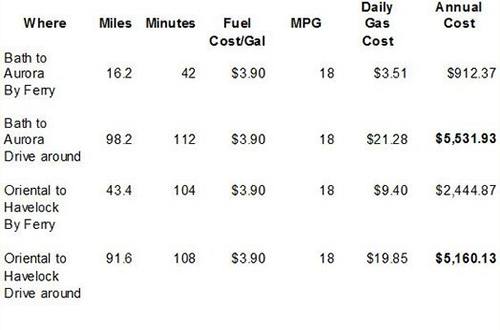Publisher's Note: This article originally appeared in the Beaufort Observer, and was written by Phil & Aven Rosch, which appeared in the in The County Compass .
Public hearings announced
Our state's ferry system is truly a treasure and I would hate to see us mess up a good thing. There are two aspects to the ramifications of adding and increasing tolls on the ferry system -- impact on tourism and impact on the local economy.
Four of the NC Ferry System destinations are free, and three have a small fare. Swan Quarter to Ocracoke round trip, for example is $30 for a car full of people and the ride is 2 ½ hours. Just for comparison, the Nantucket Ferry in Massachusetts is $225 for the car and $17.50 per head for passengers for a 2 hour and 15 minute ride. The Woods Hole Ferry to Martha's Vineyard is $8 per head and $77.50 for the car. Block Island Ferry rates are $14.75 per head and $63.10 per vehicle.
Clearly, Martha's Vineyard, Nantucket, and Block Island are popular destinations, but Ocracoke Beach ranks third of the "10 best beaches in the entire world" and the same quality beach runs 121 miles along the Outer Banks to the Virginia border.
Thanks to the ferry system, we are only 56 miles to the Swan Quarter ferry and can spend a weekend on Ocracoke for less than $100 due to our "America the Beautiful Senior Passes" for National Parks.
One might argue the Outer Banks has the reputation for Blackbeard and his pirates, but based on ferry fees, New England ferry providers win the price for fiscal rape and plunder. The difference in cost to enjoy a beautiful vacation isn't lost on our tourists.
So why should North Carolina maintain our bargain rates? The short answer is people passing through or visiting will discover North Carolina and fall in love with it as Aven and I did. When baby boomers retire and take root in North Carolina, they bring 401K and pension income, without any corresponding impact on school systems. They don't soak up jobs, preferring to simply enjoy our state's resources and leave their money in the hands of local businesses.
Our ferry system is, in many cases, the first thing a visitor sees when they visit eastern North Carolina, and the dramatic difference between "other" ferry systems and ours is just another reason to make eastern North Carolina a "final destination."
Local economic impact is also a factor. The first question is "What is the value of the ferry?" The following numbers reflect a family that lives in the Bath area and works at PotashCorp - Aurora, and a family that lives in Oriental and works in Havelock.
If we
The Driving Schedule for Trucks
assume lots of family have trucks and they get around 18 miles per gallon, then the impact on the average family of using the ferry or driving around via the nearest bridge is devastating.
According to the press, the amount of funding needed to leave ferry rates alone is $5 million. Come on folks, this is NOT the national deficit. We should be able to find creative alternatives to fund the additional ferry division cost without raising rates and implementing tolls on currently free routes, which requires hiring staff and building "toll booths."
One simple solution would be to add just 59 cents to each annual motor vehicle registration. There are 8.5 million vehicles registered in North Carolina. Yes, you might hear some whining out of Raleigh because they don't travel Down East every day, but eastern North Carolina folks could also say we shouldn't fund their snow plows because we don't get snow here.
Another simple solution is the North Carolina phone tax. We already fund the 911 service with a 60 cents tax and the North Carolina Telcom tax (whatever that is) costs an additional $1.36 per line per month. There are currently 9.75 million people living in North Carolina. If five million of them have cell phones, adding a 5-cent monthly tax would also resolve the ferry funding problem.
The bottom line, from both a tourist and a local economy perspective, is to not get our shorts in a bunch by adding more government and infrastructure. The prudent alternative is to simply add that 59 cents to our annual DMV check or a nickel to our phone tax.
Commentary (Beaufort Observer team)
While we think Phil and Aven Rosch raised some interesting and important points in their County Compass article and we are glad to have their contribution to the discussion of ferry tolls, we cannot not agree on the point of raising transportation revenue from additional fees on cell phones...or any telecommunication service for that matter. The rational justification for the government imposing special fees is that the fees are directly related to the service being taxed by those fees.
There are essentially two kinds of government revenue: General taxes and special taxes or fees. The rationale behind general taxes is that everyone should pay and the rationale behind special taxes is that those who benefit most should pay more for those services than those who do not use or directly benefit from the fees.
Applying that rationale to the ferry operations it would make sense to increase the gasoline tax rather than increase the phone fees.
But the argument they make about the users of the ferries paying for that service is a good one. We do see that the operation of the ferries is an economic development issue. Employees who travel the Aurora/Bayview ferry add significant economic value by the contribution of their labor to the PCS operation, which in turn benefits a much larger area than just the immediate proximity and of course the economic impact of PCS on the state's economy is much greater than the additional cost those workers impose on the transportation system.
From a purely political perspective, the General Assembly made a mistake when they forced the Department Of Transportation to raise the tolls without taking into consideration that those people who use the ferries to get to work should be given a break. We think provision should be made for PCS and other employers to purchase annual passes for their employees to use the ferry runs in proximity to the worker commutes. While we don't know the correct amount, we do believe that the rationale that daily use of the ferry for work commute is different, and should be taxed differently, than other uses, such as tourist traffic.
And we have heard the argument that the cost of operating a ferry per mile is much greater than the cost of a road. But we don't think that is rational. It also costs more to build a road in the mountains than it does Downeast in flat country, but the gas tax is still the same in both places.
Having said all that, we must concede that we believe the people who live in Beaufort County and drive to work at ECU have a good point in that once they get to work they have to pay substantial fees to park on state property. Why should the tax payers, through taxes that go to support the University system, not pay for parking for employees if the state is going to make taxpayers who don't use the ferries pay to subsidize their operation for people who use them for work?
We think the General Assembly was entirely correct when it concluded that the ferries should be much closer to self-supporting than they are but we think they would have been smarter to have distinguished between people who use the ferries to commute to work and people who use them for other purposes.
Our bottom line is that the ferries should be supported by general tax revenue and supplemented by user fees but we don't think phone user taxes should be shifted to support ferries any more than the lottery revenue, ABC taxes etc. should be shifted to support ferries. He who benefits should pay, or everyone should pay.
But our office wag may have the answer to all of this. He says: DOT should raise the ferry tolls, provide for employers like PCS to buy a discounted annual pass and then PCS should tell the Department of Commerce they need an economic development incentive grant to "save jobs" and pay the higher ferry tolls for its workers from the grant. Or to keep it simple for DOT, they could just subsidize the ferries like they do mass transit, bicycle paths etc.. Problem solved.
Finally, we would offer: This issue just shows how poorly government is at picking and choosing winners and losers. If private enterprise were addressing this problem it would set the ferry tolls just below the Point of Diminishing Returns, and give a discount for exceptional use. Politicians would give a tax credit to those who pay ferry tolls.
But people in Beaufort County should remember: We wouldn't have this problem is the US 17 By-pass had been built where it should have been.
A group opposed to the 'Ferry Tax" is organizing for the public hearings that will be held on the tolls.
Click here to access press releases on this issue.






















